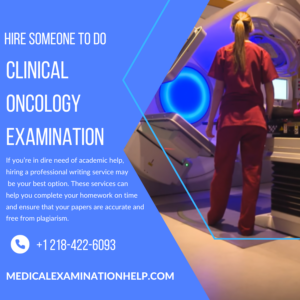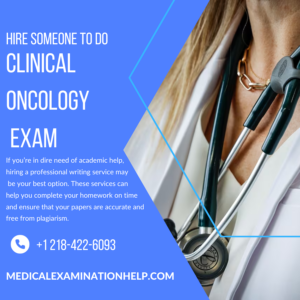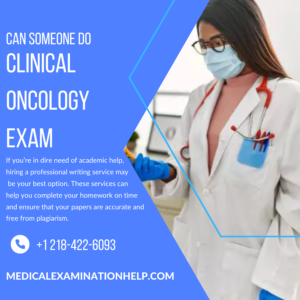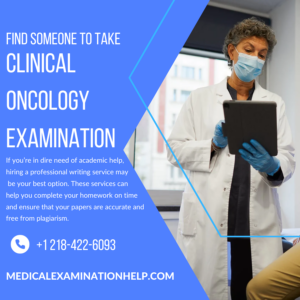
 To become a medical oncologist, a doctor must complete an internship and specialized training in cancer. They will then pass an examination and become licensed in their specialty. They can be found at hospitals and clinics in their community. They also often work at private offices. Patients can get information about doctors by asking family members or friends, Pay Someone To Take Medical as well as by checking online resources.
To become a medical oncologist, a doctor must complete an internship and specialized training in cancer. They will then pass an examination and become licensed in their specialty. They can be found at hospitals and clinics in their community. They also often work at private offices. Patients can get information about doctors by asking family members or friends, Pay Someone To Take Medical as well as by checking online resources.
A clinical oncologist is a cancer specialist who works in the treatment of patients with cancer. They work in a multidisciplinary team with other specialists such as surgeons, pathologists and radiologists. They must be able to communicate well with their patients and their families. They also need to work well with colleagues in the multidisciplinary team.
The FRCR exams form an essential part of clinical oncology training in the UK. The First FRCR exam is taken after one year of specialty training and tests the basic sciences of medical physics, medicine, cell biology, radiology and clinical pharmacology. It also covers the management of common and some less common malignant diseases.
The Final FRCR exam is composed of two single best answer papers. The questions are written in a ‘best of five’ format, Clinical Oncology with a single correct option and four distractors that are closely related to it and act as plausible alternatives. Once successful, doctors will be awarded a Fellowship of the Royal College of Radiologists and can apply for full GMC registration.
FRCR Examinations require candidates to demonstrate a wide knowledge of subjects relevant to the care and investigation of patients with malignant disease. Each written paper contains 120 single best answer (SBA) questions in a ‘best of five’ format. One mark is awarded for each correct answer with no marks available for incorrect answers. The final part of the exam is a clinical examination which comprises a series of strictly timed clinical assessment ’stations’ where your skills are assessed by a pair of examiners.
Physicians who choose the new pathway will take shorter, 2-year exams instead of the traditional 10-year exam. This is especially attractive to physicians in the early stages of their careers, since they won’t be penalized if they fail the first test or two. However, Trials In Clinical Oncology physicians can still take the 10-year exam if they prefer. ABIM and ASCO announced the new testing path in May 2018 after gathering feedback from physicians. It will initially include three assessments focused on hematologic malignancies and breast cancer, with more to follow in even-numbered years based on physician interest.
If you have friends or family members who’ve had cancer, ask them about their experience with medical oncologists. They’ll tell you which doctors took care of them and what the process was like. In addition, you can find out which doctors have the most experience and credentials.
Developing good study skills is essential for passing a board exam. You should create a study schedule and include the time to obtain study materials. Studying in small blocks is more effective than studying in long sessions. Try to make a habit of reviewing your notes every day. Also, Facing Clinical Oncologists it’s a good idea to memorize the generic names of drugs rather than brand names.
You can find out more about the exam content by examining the FRCR clinical oncology syllabus. This should be the foundation of your studies. You should also familiarize yourself with the FRCR curriculum implementation tools. These tools are available on the Royal College website and include a variety of learning resources.
The MRC Clinical Oncology exam consists of an oral and written component. The written component is the FRCR Part 1 examination, which expects candidates to have acquired a broad knowledge of those subjects that relate to the investigation and management of patients with cancer. This exam uses a patient-based curriculum that includes history taking and initial investigations, as well as their logical utilization in approaching a diagnosis.
The clinical examination is a series of five strictly timed clinical assessment ‘stations’, each of which will be assessed by two pairs of examiners. Each station focuses on a different tumor site. The candidate should be “bare below the elbow” during this examination, and they will need to bring a stethoscope, 15 cm ruler and a pen.
Once the exam is complete, candidates receive their score reports via email. This information is used to help set the next MRC clinical oncology exam and compare trainee results across programs. Questions that are deemed overly difficult, which fail to distinguish between high and low scores, Healthcare Professionals or for which new evidence emerges between the time of question writing and exam administration, are reviewed and adjusted as necessary.
 As a clinical oncologist, you will treat patients with cancer. You will give them drug treatments and radiotherapy, Patients With Cancer-Related either as a cure or palliative care. You also need to have first-class people skills.
As a clinical oncologist, you will treat patients with cancer. You will give them drug treatments and radiotherapy, Patients With Cancer-Related either as a cure or palliative care. You also need to have first-class people skills.
The FRCR examination is divided into Part A (single best answer papers) and Part B (viva). The exam is held twice a year, in the spring and autumn.
The medical academic assignment and exam help service industry is highly competitive. Choosing the right specialty requires careful consideration. A career in hematology or oncology can be rewarding, but the training required is longer than other specialties. If you are unsure which specialty is right for you, consider speaking with an admissions counselor. These professionals can help you navigate the application process and provide valuable tips for preparing for oncology residency programs.
The FRCR examination has a written part and a clinical exam. The clinical exam consists of five strictly timed assessment ‘stations’ each lasting eight minutes with a pair of examiners assessing your clinical skills in a realistic scenario. The written part of the examination contains 120 questions.
The examination is developed by a team of experts including physicians who are recognized as content specialists and a linguistic reviewer to ensure the accuracy of the terminology used. The FRCR also provides an extensive list of reference material, Optimize Cancer Treatment which can be found on the Oncology PRO Tumor Sites Portal.
Whether you’re talking to friends or family members who have a friend or family member with cancer, it’s important to ask them about the doctors that treated them. This can help you find a doctor who is right for you and your loved one.
A medical oncologist is a specialist in cancer treatment and works as part of a multidisciplinary team. They must be able to communicate with patients and colleagues alike, and they need first-class people skills. They will also need to be able to support their patients through the difficult period of diagnosis and treatment.
In addition to the written examination, you will take a clinical exam that involves rotating around five strictly timed clinical assessment “stations” where your skills are assessed by two examiners. This section of the examination will use real patients Patient-Centered Care Issues with authentic clinical signs and symptoms. You can find a variety of preparation materials for this element of the exam on the Royal College website.
To pass the clinical oncology exam, candidates need to research a wide range of materials. These include textbooks, journal articles and guidelines. The ESMO Oncology PRO Tumor Sites Portal groups ESMO resources by disease or topic area and helps candidates find relevant information more easily. Candidates are advised to consult their own physicians for advice and guidance as well.
Medical oncology is a demanding field and requires subspecialty training. It may take fourteen years to become a practicing oncologist. During this time, you will spend two to five years in a residency program. If you are not committed to this long educational journey, oncology may not be the right career for you.
It’s essential that state societies focus on marketing their organization to current members and potential ones. This can be challenging, especially for small organizations. Learn how four state societies have marketed their organization successfully and increased membership, Cancer-Related Patient Education while maintaining high retention rates. Their methods include offering real benefits and emphasizing the value of membership in their organizations.
The FRCR medical oncology exam is designed to measure the competences of an oncologist. It includes two single-best answer question papers and a clinical examination. These exams are based on a syllabus that reflects the specialty training curriculum for clinical oncology. This syllabus includes a range of topics, including radiotherapy Global Health Issues and drug therapy. The exam also covers a variety of cancer sites.
The exam was originally developed by ASCO in collaboration with subject matter experts from across the globe. These experts are selected on the basis of their disease site expertise, practice setting, and ability to write test items. Each test item goes through a rigorous review process.
A successful candidate will have passed all three parts of the FRCR examinations, which will give them Fellowship of the Royal College of Radiologists (FRCR). In addition to passing the exams, candidates will need to complete a minimum of three years of advanced clinical oncology training. This may be reduced for trainees on sick and maternity leave.
 When someone is diagnosed with cancer, they will likely want to find a medical oncologist. This person will help them through the entire process of treating the disease. Choosing an oncologist can be difficult because there are so many options. It is important to ask the right questions and make sure you understand Financial And Insurance Issues their answers.
When someone is diagnosed with cancer, they will likely want to find a medical oncologist. This person will help them through the entire process of treating the disease. Choosing an oncologist can be difficult because there are so many options. It is important to ask the right questions and make sure you understand Financial And Insurance Issues their answers.
Having first-class people skills is essential for a medical oncologist, who will be working closely with other specialists as part of a multidisciplinary team. They need to be able to help patients and their families cope with the diagnosis and treatment of cancer. Medical oncologists also need to be able to explain complex information clearly and concisely.
The exam is held twice a year and consists of two parts. The first part, the FRCR Part I, is theory-based and focuses on the underpinning basic sciences for radiology and oncology (physics, statistics, cell biology/radiobiology and pharmacology). Most registrars sit this exam at the end of their first year.
The second part, the FRCR Part 2B, is clinical oncology-based. This requires a broad understanding of the investigation and management of malignant disease, Palliative Care Issues with a particular emphasis on radiotherapy and drug therapy. The exam is examined against the ESMO clinical oncology curriculum.
A medical oncologist is a doctor who specializes in cancer treatment. They spend 2- to 5-years in residency doing special training in a hospital before they become certified and licensed to practice. They can be found at cancer centers, hospitals and private practices. Often, they are referred by family doctors or primary care physicians and patient advocacy groups. Like other doctors, they conduct a history and physical exam and take a head-to-toe patient’s temperature. They will also review your family’s medical history and note if anyone has had similar illnesses. This part of the examination is called the History of Present Illness (HPI). (Bickley & Szilagyi, 2012)
They will ask about the duration, location, characteristics, Quality Of Life Issues aggravating and relieving factors of your symptoms or signs.
Medical oncologists work in a wide variety of settings and with patients with a diverse array of disease sites. They use their skills to diagnose and treat a wide range of cancers and other diseases using the latest in treatment methods, including radiation therapy, surgery, chemotherapy, biologic agents, and other modalities. They must also have knowledge of common general medicine, surgery, and genecology problems.
The exam is designed according to a blueprint that reflects the Medical Oncology Competencies. It includes a written portion, which assesses a candidate’s medical expert role, and a clinical examination.
The written portion consists of eight long cases in question and answer format, which test the core knowledge required for a medical oncologist to function competently. Questions are presented in a ‘best of five’ multiple choice format, Menopausal Symptoms with one correct answer and four distractors that are closely related to the correct answer but less correct. Questions are vetted for accuracy by a Royal College team of language professionals and physicians.